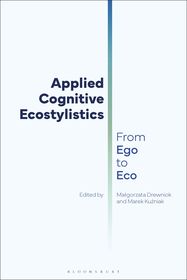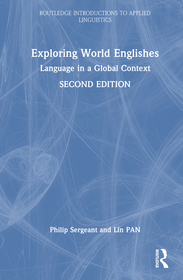
Applied Cognitive Ecostylistics
From Ego to Eco
-
20% KEDVEZMÉNY?
- A kedvezmény csak az 'Értesítés a kedvenc témákról' hírlevelünk címzettjeinek rendeléseire érvényes.
- Kiadói listaár GBP 28.99
-
13 849 Ft (13 190 Ft + 5% áfa)
Az ár azért becsült, mert a rendelés pillanatában nem lehet pontosan tudni, hogy a beérkezéskor milyen lesz a forint árfolyama az adott termék eredeti devizájához képest. Ha a forint romlana, kissé többet, ha javulna, kissé kevesebbet kell majd fizetnie.
- Kedvezmény(ek) 20% (cc. 2 770 Ft off)
- Kedvezményes ár 11 080 Ft (10 552 Ft + 5% áfa)
Iratkozzon fel most és részesüljön kedvezőbb árainkból!
Feliratkozom
13 849 Ft

Beszerezhetőség
Még nem jelent meg, de rendelhető. A megjelenéstől számított néhány héten belül megérkezik.
Why don't you give exact delivery time?
A beszerzés időigényét az eddigi tapasztalatokra alapozva adjuk meg. Azért becsült, mert a terméket külföldről hozzuk be, így a kiadó kiszolgálásának pillanatnyi gyorsaságától is függ. A megadottnál gyorsabb és lassabb szállítás is elképzelhető, de mindent megteszünk, hogy Ön a lehető leghamarabb jusson hozzá a termékhez.
A termék adatai:
- Kiadó Bloomsbury Academic
- Megjelenés dátuma 2025. december 11.
- Kötetek száma Paperback
- ISBN 9781350362222
- Kötéstípus Puhakötés
- Terjedelem oldal
- Méret 234x156 mm
- Nyelv angol
- Illusztrációk 10 bw illus 700
Kategóriák
Hosszú leírás:
This book offers an up-to-date account of one of the most influential strands of eco-research: cognitive ecostylistics. The onset of the 1970s saw a global shift in scholarly perspective upon the relation between egocentric and ecocentric views of the world. The so-called eco-turn was not only linguistic at its roots, but engaged the bulk of academic thought in social sciences and humanities.
Cognitive ecostylistics invites a multidisciplinary approach to the study of the conceptual relations between oral or written texts and their impact on the environment. This volume is a collection of the latest research that seeks to apply the theory and methodology developed over the last 40 years to both literary and real-life texts, engaging with a wealth of examples from First World War poetry and Anne of Green Gables through to Condé Nast Traveller hotel descriptions. Exploring the cultural effects of the eco-turn, the collection engages the reader in the problem of the present-day Anthropocene, manifested as Ego-Eco tensions at the level of communicating self-needs and the needs of the Other. Divided into two parts, it considers first the human-angled semiotic interplay contained within the universe of people, before examining the problem of semiotic engagement of texts as extraneous to the human, highlighting crucial aspects of nature, culture, and beyond.
Tartalomjegyzék:
List of Figures
List of Tables
List of Contributors
Introduction: A New Ecology of Language, Peter Stockwell (University of Nottingham, UK)
Part I: From EGO: Self- Needs, Readership, Society
Overview
1. From Ego- to Eco-Centricity: Macro- and Micro-levels of Condé Nast Traveller Hotel Descriptions, A Cognitive-Linguistic Account, Malgorzata Drewniok (University of Lincoln, UK) and Marek Kuzniak (Wroclaw University, Poland)
2. A Diffractive Analysis of Readers' Responses to Julian Barnes's 'The Sense of an Ending', Amélie Doche (Birmingham City University, UK)
3. Cohesion and Solidarity in COVID-related Addresses to the Nation, Chris Fitzgerald (Mary Immaculate College, Ireland) and Helen Kelly-Holmes (Mary Immaculate College, Ireland)
4. Using Think-Aloud Data to Explore Pathetic Fallacy's Impact on Narrative Empathy, Kimberley Pager-McClymont (University of Aberdeen, UK) and Fransina Stradling (University of Huddersfield, UK)
5. Reader's Reactions to Descriptions of Landscape in Polish Translations of Anne of Green Gables, Beata Piecychna (University of Bialystok, Poland)
Part II: To ECO: Nature, Culture, and Beyond
Overview
6. Methodological Implications of Building the Corpus of News on Economic Inequality (1971-2020): Text Readable Data vs OCR Material, Eva Gómez Jiménez (University of Granada, Spain)
7. Modelling the Landscape of Wilfred Owen's 'Futility', Marcello Giovanelli (Aston University, UK)
8. Intralingual Eco-Translation Insights into 'Macbeth' in African American Urban Slang, Michal Garcarz (University of Wroclaw, Poland)
9. Fictional Ekphrasis Representing Childhood Trauma in M. Atwood's Cat's Eye, Polina Gavin (Aston University, UK)
10. Body, Mind, and Nature in Rossetti's 'For a Venetian Pastoral by Giorgione (In the Louvre)', Eirini Panagiotidou (West Chester University of Pennsylvania, USA)
Conclusion: Pathways to Eco, Malgorzata Drewniok, University of Lincoln, Marek Kuzniak (Wroclaw University, Poland)
Index






